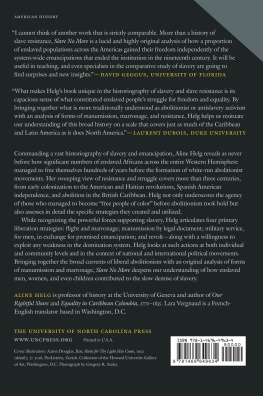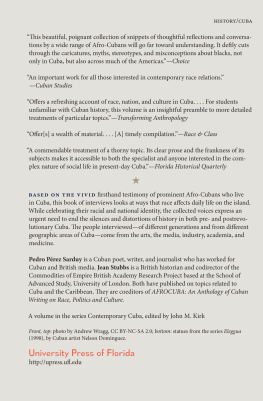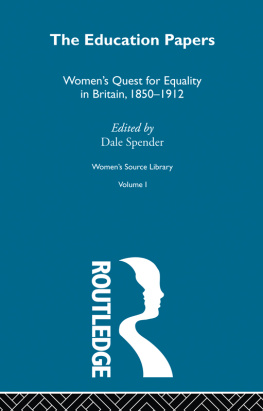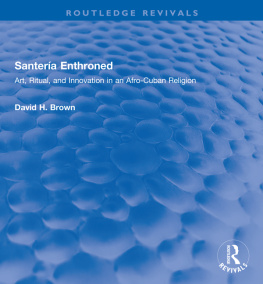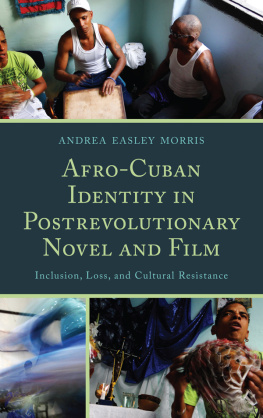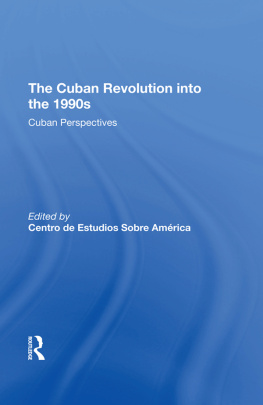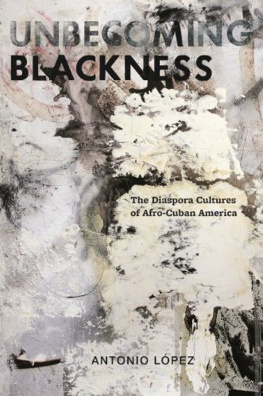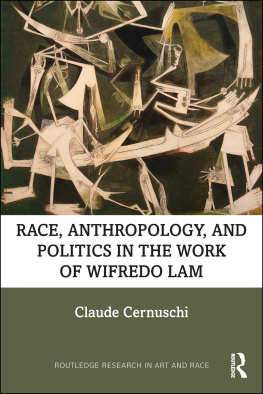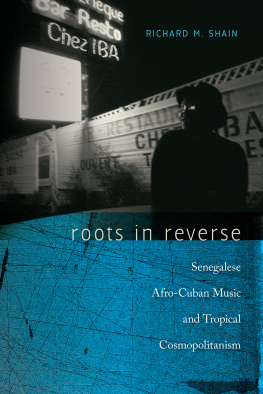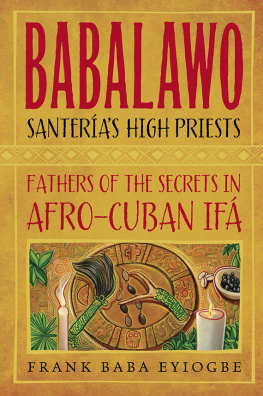Our Rightful Share
Our Rightful Share
The Afro-Cuban Struggle for Equality, 18861912
Aline Helg
The University of North Carolina Press
Chapel Hill and London
1995 The University of North Carolina Press
All rights reserved
Manufactured in the United States of America
The paper in this book meets the guidelines for permanence and durability of the Committee on Production Guidelines for Book Longevity of the Council on Library Resources.
appeared in an earlier form in Aline Helg, Afro-Cuban Protest: The Partido Independiente de Color, 19081912, Cuban Studies 21 (1991): 10121, Louis A. Perez, Jr., editor, and is reprinted by permission of the University of Pittsburgh Press. 1991 by the University of Pittsburgh Press.
Aline Helg is associate professor of history at the University of Texas at Austin.
Library of Congress Cataloging-in-Publication Data
Helg, Aline, 1953
Our rightful share: the Afro-Cuban struggle for equality, 18861912 by Aline Helg.
p. cm.
Includes bibliographical references and index.
ISBN 0-8078-2184-5 (alk. paper). ISBN 0-8078-4494-2 (pbk.: alk. paper)
1. BlacksCubaHistory. 2. Race discriminationCubaHistory. 3. CubaRace relations. 4. CubaHistory. I. Title.
F1789.N3H45 1995
972.91 00496dc20
94-27196
CIP
04 03 02 01 00 7 6 5 4 3
To Janou Helg-Emery and Roger Helg
Contents
A map of Cuba follows page xiii.
Illustrations
Acknowledgments
While I researched and wrote this book, I benefited from the generosity of many individuals and institutions. During the time I lived in Cuba, Olga Cabrera, Toms Fernndez Robaina, Enrique Sosa, Francisco Rivero, and the late Israel and Azucena Echevarria offered me friendship, hospitality, and insight into the Cuban past and present. In Cuba I also learned much from the enriching conversations I had with Walterio Carbonell, Jorge Ibarra, Eduardo Torres Cuevas, Ramon de Armas, Manuel Moreno Fraginals, Jean Stubbs, Pedro Perez Sarduy, Nancy Morejn, Zoila Lapique, Julio LeRiverend, Reynaldo Gonzlez, Leyda Oquendo, Pedro Deschamps Chapeaux, Rafael Duharte, Enrique Cordies, Carlos Nicot, and the late Argeliers Len and Leopoldo Horrego Estuch. Maria Poumier-Taquerel and Paul Estrade in Paris and Elena Hernandez Sandoica in Madrid offered intellectual support.
I owe an enormous debt to my colleague Richard Graham at the University of Texas, who supported my work with encouragement and professional advice from beginning to end. I greatly benefited from the intellectual support of Franklin D. Knight, Louis A. Prez, Jr., George R. Andrews, and Jonathan C. Brown, who commented extensively on the manuscript. I thank Virginia Hagerty for her careful editing of drafts of the work. I am indebted to Rebecca J. Scott, Michael Hanchard, Dean Ortega, Robert H. Abzug, Rosalie Schwartz, and Sandra Lauderdale Graham, who provided stimulating comments on portions of the manuscript. I thank the graduate students in my course on Cuban society for their supportive challenge. I am also grateful to Gina Sconza, David S. Peterson, and Fannie T. Rushing for their continuing encouragement.
I would also like to thank David Perry and Christi Stanforth of the University of North Carolina Press, as well as the two scholars who reviewed the manuscript for the Press. Their reports helped me to sharpen the manuscript and bring it to completion.
I owe an immeasurable debt to the staffs and directors of the Archivo Nacional de Cuba, the Biblioteca Nacional Jos Mart, the library of the Instituto de Literatura y Lingustica, the library of the Instituto de Historia del Movimiento Comunista y de la Revolucin Socialista de Cuba Anexo al Comit Central dei Partido Comunista de Cuba, and the archive of the Gran Logia de la Isla de Cuba in Havana; the Archivo Histrico Nacional, the Biblioteca Nacional, and the archive of the Ministerio de Asuntos Exteriores in Madrid; the Archivo General de Indias in Seville; the Public Record Office in London; the archive of the Ministre des Affaires Etrangres in Paris; the U.S. National Archives and the Library of Congress in Washington, D.C.; and the Benson Latin American Collection and the Perry-Castaneda Library of the University of Texas at Austin.
I must also acknowledge a further debt to the institutions that financed this project. The Swiss National Fund for Scientific Research has been extremely generous in helping me to do research and write the manuscript. I am also grateful to the University of Texas Research Institute, the American Philosophical Society, the National Endowment for the Humanities, and the Dora Bonham Fund of the University of Texas at Austin for awarding me research and travel grants.
This book is dedicated to my parents, Janou Helg-Emery and Roger Helg, who played an important role in shaping my view of the world and the issues that concern me. My mother, in addition, read the manuscript with the perceptive eyes of the nonspecialist. Finally, many thanks to my daughter, Malika. She is still too young to understand my debt to her, but she has been a source of joy and inspiration during the completion of this book.
Our Rightful Share
Introduction
The Dynamics of Ideology and Action
Black woman gives birth to black child, white woman gives birth to white child, and both are mothers.
Black we are, we dont stain, human beings we are, hearts we have.
All hearts are colored.
Afro-Cuban proverbs (Cabrera, Refranes de negros viejos)
On 18 July 1912, Lt. Pedro Ivonnet was shot in Oriente according [to] good usage, while trying to escape. His body, flung across a horse, was brought to Santiago de Cuba, where it was paraded through the streets of the capital of the eastern province and exposed to the public before burial in a common grave. to impose their dictatorship on the whites of the island.
In many ways, Ivonnet embodied the hopes and disappointments of Afro-Cubans after independence. A descendant of refugees from the Haitian Revolution (17911804), he was an oriental (i.e., a native of Oriente) and a veteran of the Liberation Army of 189598. He had fought by the side of Afro-Cuban general Antonio Maceo and the rebels from Oriente when they invaded the western section of the island to liberate it from Spain. This direct experience of armed power and command had enhanced his self-esteem and broadened his organizing capacities and expectations for the future. A disillusioned Moderate in the early 1900s, Ivonnet joined the Partido Independiente de Color after its creation in hope of achieving a better black political representation. Imprisoned in 1910 with dozens of independientes for allegedly conspiring to establish a black republic, he witnessed from jail the banning of his party on grounds that it was racist. Two years later in Oriente, he led the armed protest to relegalize his party. His killing tragically illustrates that one decade after independence, Cuban society was still deeply divided along racial lines and was still haunted by the fear of a black revolution.
How can one explain the massacre of Afro-Cubans in 1912a massacre that was often led by white veterans of the Liberation Army and took place overwhelmingly in the province that had been the birthplace of the Cuban nationalist movement? Why this persistent fear that a racial revolution along Haitian lines would occur in Cuba? Why were Afro-Cubans denied any semblance of political autonomy, and how was this denial justified by the dominant ideology? More important, what were the roots and the significance of Afro-Cubans pioneering struggles for equality?




